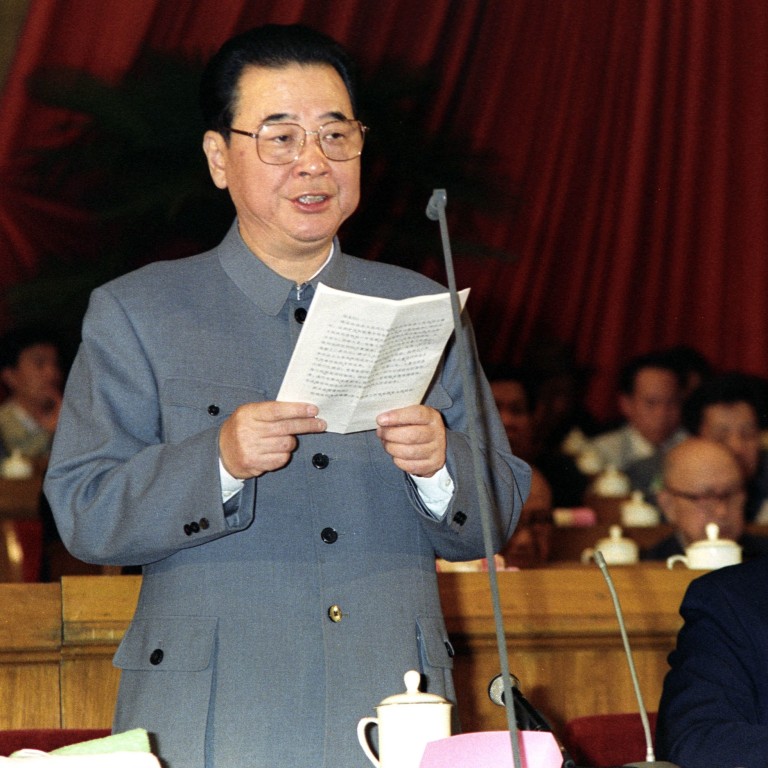
Li Peng wasn’t the butcher of Tiananmen, just the man who took the fall for Deng Xiaoping
- Li’s arrogance made him easy to hate in 1989, but he was picked on because his boss Deng Xiaoping had a no-nonsense manner that intimidated even rebels.
- It is to Li’s shame that he enabled Deng’s will and did not resist the crackdown
Awkward and homely, bumbling and bashful, he was a loyal apparatchik pushed far beyond his own meagre talent, a tech nerd out of his depth and forced into a wholly inappropriate role at a historic moment.
His imperious airs, his unbridled arrogance made him a natural target, doubly so because he was under the command of a rather more competent and charismatic man.
Li came off looking bad, deservedly so, but what did it matter? A crackdown was coming, a crackdown he came to be the symbol of, not because he was the author of it, but because that was the role he was assigned to play
I can still hear the echoes, the chorus of the crowd marching up and down Changan Avenue shouting “dadao Li Peng!” or “down with Li Peng!” over and over.
The crowd, for all its courage, never got into the habit of shouting “down with Deng Xiaoping!” because Deng’s tough, thick-skinned persona did not lend itself to bullying.
He was more powerful than Li Peng, which was one consideration, but he was also a no-nonsense sort, a man who might be slow to react but whose decisions, sent down the chain of command, had consequences.
Opposition to Deng was tacit but unspoken. The closest the protesters came to directly confronting Deng was making a passive-aggressive show of breaking little glass bottles homophonous with his name.
Even the long-dead Mao Zedong was treated with more reverence by the rebel students than the hapless premier.
Li Peng was criticised precisely because he wasn’t the toughest kid in the sandbox; you could get a rise out of him because he was ill-tempered, thin-skinned and quick to take offence.
So why did the reticent, mild-mannered Li become known as the “butcher of Beijing”?
The phrase, at once alliterative and catchy, falls off the lips with a resonance reminiscent of “dadao Li Peng” but it is less honest and less accurate. It was a Western media meme obscuring a reality that was plain for the Chinese people to see.
Chinese youth don’t know history, but it’s not their fault
Li Peng was premier, but in the Chinese communist system, the prime minister is neither in charge nor much of a leader in any meaningful sense.
Li Peng’s perfidy ensured him a place in power and, no doubt, a life of great material comfort, but history will be far kinder to Zhao. Unlike Li, Zhao stood up, albeit rather late in the game.
Not only did the protesters love to hate Li, but his communist colleagues kept their distance as well, relegating to him the role of scapegoat for a decision made at the pinnacle of power.
The hapless Li never succeeded in convincing people he had been doing Deng’s bidding when he did his worst, even after Deng died.
Li was an enabler of Deng’s will, and although the slyly pro-Deng depictions of the 1989 power struggle in Beijing in the so-called Tiananmen Papers might suggest otherwise, I take Li’s word for it.
Li chose discipline and compliance, sticking with the values that shaped him. Perhaps, as he later claimed, he saw the protests as an existential threat to the party and indeed his own career, but deviating from Deng’s line would have been a career-ender too.
Endless nightmares, ruined lives: the Tiananmen legacy
Premier Li had achieved his position not just through powerful connections, but through obsequiousness to higher-ups.
It was only natural to him that a handful of nobodies from nowhere should listen meekly while he hectored and humoured them with avuncular advice, especially that impertinent kid from Xinjiang.
Li’s clumsy outreach went nowhere, even if there was a measure of sincerity in his befuddlement.
The TV dialogue was a clash of personality and style between the cosseted scion of old revolutionaries and the new generation of rebels.
Li came off looking bad, deservedly so, but what did it matter? A crackdown was coming, a crackdown he came to be the symbol of, not because he was the author of it, but because that was the role he was assigned to play.
Philip Cunningham is the author of Tiananmen Moon, a first-hand account of the 1989 Beijing student protests

